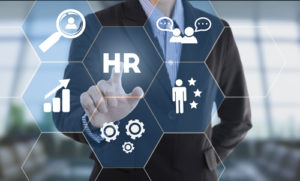Deloitte’s 2017 Global Human Capital Trends report found that nearly 80 percent of executives surveyed rated employee experience as important, while only 22 percent reported that their organizations were excellent at building a differentiated employee experience. This is often related to legacy human resources (HR) systems that don’t support a modern experience, or fragmented processes that are too manual and don’t use digital tools. These realities can cause your university’s stakeholders to be disappointed with institutional interactions.
Fragmented systems and processes can create frustration for employees when, for example, they’re unable to find the information they need to manage their careers or life events, or when their attempt to execute HR tasks becomes complex and time-consuming.
Today’s digital workforce demands access to information that is predictive, personalized, and easily accessible. So, why don’t HR departments offer something similar?
Making the shift to digital
HR leaders are beginning to recognize the need to shift from “systems of record” to constituent-centered models. And while building a digital organization of the future is challenging for any industry, this is especially true in higher education, where the quality and reputation of your faculty, students, and staff is of the utmost importance.
In 2018, we are likely to see transformation in higher ed. Digital technologies can improve HR’s ability to effectively address a number of issues—and, in the process, transform the employee experience.
Establishing a digital workplace
Building a digital workplace is one way your institution can accomplish digital HR. Digital workplaces do the following:
- use insights and analytics to provide predictive, personalized, and guided HR interaction
- protect employees and managers from having to navigate multiple HR systems
- promote more collaborative relationships between employees and HR
- offer convenience and choice to access and complete HR tasks through mobile app capabilities
- facilitate communication using familiar chat and community features
The digital workplace is a solution for engaging employees in all the services they have available. It’s about growing capabilities by targeting information and learning content to employees to help them do their jobs, just as social media sites target posts based on member preferences. It’s about empowering community by bringing the social communication concept to the workplace to connect people. And it’s about boosting credibility by using insights and analytics to drive process improvement.
However, it is important to keep in mind that creating a digital institution is about more than just technology. Being digital is a mindset shift that requires the raising of a collective “digital IQ”—where organizing, operating, and behaving in a culturally digital way becomes the real mark of a digital organization. This new organization is self-organizing, flexible, collaborative, innovative, and willing to experiment.
For higher ed to be digital, you need to create an experience that combines technology and other equally important factors, such as employee and student engagement and satisfaction, flexibility, development opportunity, agility, collaboration, and communication. And the list goes on.
As HR leaders think about their institution’s path forward, it is important to step outside their comfort zone and disrupt their own thinking as they seek to build an HR capability that will prove adaptive and sustainable in this age of disruption.
- How we connect incoming students to the university resources they need - July 4, 2025
- AI and the workforce: Reskill to meet the moment - July 1, 2025
- Beyond the game: Why business expertise is the future of sports management - June 26, 2025
